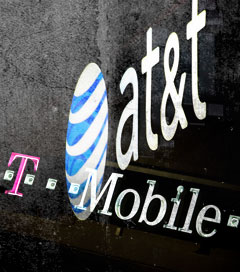Mobile company Sprint on Tuesday formally requested the Federal Communications Commission (FCC) to block AT&T's proposed merger with T-Mobile. Sprint said the $39 billion deal could harm consumers and give AT&T anti-competitive control over the wireless market, even with added regulations and conditions, and could lead to a duopoly that prevents innovation and economic growth.
“The Commission faces a stark choice in this proceeding,” Sprint executives wrote to the FCC in their 377-page Petition to Deny. “It can reject AT&T's bid to take over T-Mobile and extend the last two decades of robust competition in the wireless industry…. Or the Commission can approve the takeover and let the wireless industry regress inexorably toward a 1908s-style duopoly.”
Media watchdog group Free Press also filed papers with the FCC on Tuesday, urging regulators to reject the acquisition. The organization has long been a vocal critic of the proposed deal, recently saying that it would lead to “nothing but higher prices and fewer choices.”
Don’t miss a beat – get Truthout Daily Email Updates. Click here to sign up for free.
Following the filing, Free Press President and CEO Craig Aaron said, “The FCC's mandate is to ensure this merger is in the public interest, and thus it has no choice but to block the deal.”
In its petition, Sprint outlined a number of potentially harmful outcomes of the takeover. Specifically, the deal could harm consumers by making AT&T the country's largest wireless carrier by far, with 118 million subscribers and 43 percent of the market. Along with Verizon's 39 percent of the market, Sprint said, “the transaction would create a Twin Bell duopoly with 82 percent of post-paid subscribers,” making the two carriers “gatekeepers of the digital ecosystem.”
Sprint also warned that the deal could stifle innovation and development of new devices, reducing choices for consumers. “The result of diminished competition would be less innovation and economic growth in the US wireless sector, which would have serious adverse implications for the US economy as a whole,” Sprint wrote.
Lastly, the company said, AT&T has perpetuated false claims that the merger is necessary to ease capacity constraints and provide Internet access to 97 percent of the populations. “AT&T can achieve both alleged benefits without the anti-competitive elimination of the nation's fourth largest carrier and the only other national GSM competitor.”
Jim Cicconi, AT&T senior executive vice president of external and legislative affairs, responded to Sprint's petition a few hours after the filing. “To be sure, the usual suspects opposing the transaction are working to create the impression that their support is growing,” Cicconi wrote on AT&T's Public Policy Blog. “It's not … Let's keep in mind that the standard under which the FCC operates is whether a merger, in this case our merger with T-Mobile, is in the public interest. The answer from elected officials and respected state and national organizations from every walk of life is a resounding yes.”
Cicconi pointed out that the deal has garnered support from the AFL-CIO and a number of governors and mayors. “Even if combined with those few groups who routinely oppose every merger, this opposition pales in comparison with the scale of public interest support we are already starting to see … and which we have every reason to feel will continue to grow,” Cicconi wrote.
The FCC will examine whether the deal meets a standard of being in the public interest, while the Justice Department will investigate whether the merger could harm competition. The agencies' combined reviews are expected to take about a year.
Join us in defending the truth before it’s too late
The future of independent journalism is uncertain, and the consequences of losing it are too grave to ignore. To ensure Truthout remains safe, strong, and free, we need to raise $43,000 in the next 6 days. Every dollar raised goes directly toward the costs of producing news you can trust.
Please give what you can — because by supporting us with a tax-deductible donation, you’re not just preserving a source of news, you’re helping to safeguard what’s left of our democracy.
